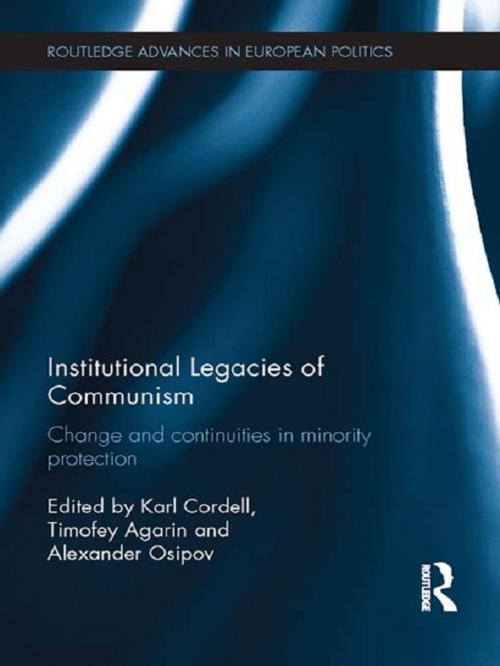Institutional Legacies of Communism
Change and Continuities in Minority Protection
Nonfiction, Social & Cultural Studies, Political Science| Author: | ISBN: | 9781135036652 | |
| Publisher: | Taylor and Francis | Publication: | July 3, 2013 |
| Imprint: | Routledge | Language: | English |
| Author: | |
| ISBN: | 9781135036652 |
| Publisher: | Taylor and Francis |
| Publication: | July 3, 2013 |
| Imprint: | Routledge |
| Language: | English |
Twenty years after the demise of communist policy, this book evaluates the continuing communist legacies in the current minority protection systems and legislations across a number of states in post-communist Europe.
The fall of communism and the process of democratisation across post-communist Europe led to considerable change in minority protection with new systems and national political institutions either developed or copied. In general, the new institutions reflected the practices and experiences of (western) European states and were installed upon advice from European security organisations. Yet many ideas, legislative frameworks, policies and practices remained open to interpretation on the ground. With case studies on a diverse set of post-communist polities including Slovakia, Bosnia, Macedonia, Ukraine, Estonia, Croatia, the Baltic States and Russia, expert contributors consider how the institutional legacies of the communist past impact on policies designed to support minority communities in the new European democracies.
Providing unique empirical material and comparative analyses of ethnocultural diversity management during and after communism, this book will be of interest to students and scholars of international relations, European politics, political geography, post-communism, ethnic politics, nationalism and national identity.
Twenty years after the demise of communist policy, this book evaluates the continuing communist legacies in the current minority protection systems and legislations across a number of states in post-communist Europe.
The fall of communism and the process of democratisation across post-communist Europe led to considerable change in minority protection with new systems and national political institutions either developed or copied. In general, the new institutions reflected the practices and experiences of (western) European states and were installed upon advice from European security organisations. Yet many ideas, legislative frameworks, policies and practices remained open to interpretation on the ground. With case studies on a diverse set of post-communist polities including Slovakia, Bosnia, Macedonia, Ukraine, Estonia, Croatia, the Baltic States and Russia, expert contributors consider how the institutional legacies of the communist past impact on policies designed to support minority communities in the new European democracies.
Providing unique empirical material and comparative analyses of ethnocultural diversity management during and after communism, this book will be of interest to students and scholars of international relations, European politics, political geography, post-communism, ethnic politics, nationalism and national identity.















